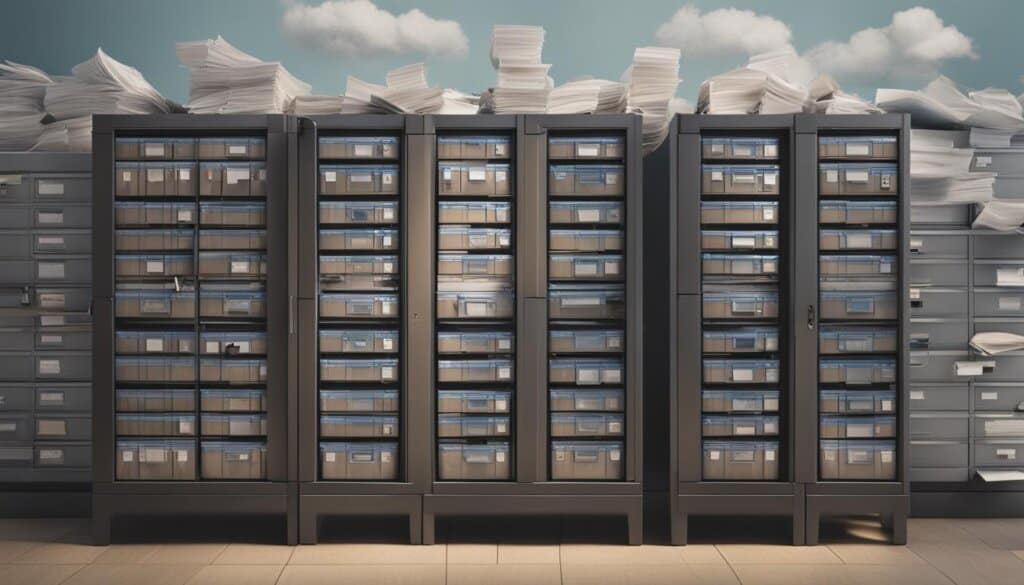Table of Contents
Record management is the supervision and administration of both digital and paper records, regardless of the format. It involves activities such as creation, receipt, maintenance, use, and disposal of records. These records can include contracts, memos, paper files, electronic files, reports, emails, videos, instant message logs, and databases. The goal of record management is to ensure that vital organizational documents are handled accurately and securely, while also complying with legal requirements and regulations related to storage, access, and use of information.
Accurate handling and secure handling of records are essential in modern organizations. Compliance with legal requirements is also crucial to avoid penalties and maintain trust with stakeholders. Let’s explore the importance of records management in more detail.
The Importance of Records Management
Records management plays a vital role in the efficient functioning of organizations, providing numerous benefits and addressing crucial aspects of information handling and security.
Historical Knowledge and Trackability
One of the key reasons records management is essential is its ability to enable easy access to past documents and track their progression over time. By maintaining accurate records, organizations can gain valuable historical knowledge, including insights into past decisions, actions, and outcomes. This historical context is invaluable for strategic planning, learning from past experiences, and making informed decisions.
Data Security and Confidentiality
Proper record keeping is crucial for ensuring the security of sensitive information. Records management practices safeguard documents from loss, unauthorized access, and breaches. Secure storage practices and access controls provide protection against physical threats such as theft and damage. Similarly, digital records are safeguarded through encryption, user authentication, and other security measures, minimizing the risk of data breaches and unauthorized disclosure.
Compliance with Legal Requirements
Records management is essential for organizations to comply with legal requirements and regulations. Proper handling, retention, and disposal of records are crucial to meet legal obligations and mitigate legal risks. By following records management best practices and adhering to applicable laws, organizations can protect themselves from fines, penalties, and legal disputes.
Effective Access Control
Records management enables organizations to implement efficient access control measures. By categorizing records and setting appropriate access permissions, organizations can ensure that only authorized personnel can view or modify sensitive information. This access control not only protects the confidentiality of data but also ensures that employees can access the information relevant to their roles and responsibilities, enhancing productivity and preventing data misuse.
“Records management is not just about organized filing systems; it is a strategic approach to maximize historical knowledge, secure information, and comply with legal requirements.”
To summarize, records management is of utmost importance for any organization. It facilitates historical knowledge, enhances data security, ensures compliance with legal requirements, and enables effective access control. By implementing robust records management practices, organizations can optimize their operations, protect valuable information, and maintain a competitive edge.
The Process of Records Management
Records management is a systematic approach to handling records throughout their lifecycle. It involves several key steps that ensure records are created, maintained, and disposed of in a controlled and compliant manner.
1. Record Creation and Receipt
Records are created or received to document business transactions. This includes capturing information in both digital and physical formats. Proper documentation at this stage is crucial as it forms the foundation for the entire records management process.
2. Record Usage and Modification
Once records are created, they are used or modified as necessary to support ongoing operations. This includes updating information, adding new data, or making changes to existing records. It’s important to document any modifications made to ensure an accurate record trail.
3. Record Maintenance and Protection
During this stage, records are actively managed and protected to ensure their security and accessibility. This involves implementing appropriate storage systems, establishing access controls, and applying security measures to safeguard records from unauthorized access or damage.
4. Record Disposal or Destruction
When records are no longer needed, they should be disposed of or destroyed in accordance with their retention schedules. This ensures compliance with legal requirements and reduces the risk of retaining unnecessary records. Proper disposal methods, such as shredding or incineration, should be employed to maintain data privacy and security.
5. Record Archiving and Preservation
Permanent records or those that need to be kept long-term are archived and preserved. Archiving involves transferring records to a secure and controlled storage environment, such as an offsite storage facility or electronic archive. Preservation techniques, such as digitization or microfilming, may be utilized to ensure the long-term integrity and accessibility of archived records.
“The process of records management is a critical component of effective information governance. It ensures that organizations can efficiently manage their records from creation to disposition, reducing risks and maintaining compliance.”

| Step | Description |
|---|---|
| Record Creation and Receipt | Records are created or received to document business transactions. |
| Record Usage and Modification | Records are used or modified as necessary for ongoing operations. |
| Record Maintenance and Protection | Records are actively managed and protected to ensure their security and accessibility. |
| Record Disposal or Destruction | Records are disposed of or destroyed in accordance with their retention schedules. |
| Record Archiving and Preservation | Permanent records or those that need to be kept long-term are archived and preserved. |
Standards and Best Practices in Records Management
When it comes to effective records management, following industry standards and best practices is crucial. One organization leading the way in this field is ARMA International, the largest global organization dedicated to records and document management. ARMA offers a wide range of resources to support professionals in this field, including training, conferences, and professional certifications.
ARMA International has also developed the Generally Accepted Recordkeeping Principles in collaboration with IT professionals. These principles provide a comprehensive framework for successful records management. They encompass key aspects such as accountability, transparency, integrity, protection, compliance, availability, retention, disposition, and preservation.
In addition to ARMA’s contributions, the International Organization for Standardization (ISO) has developed two records management standards. These standards provide valuable guidance on concepts, principles, and guidelines for standard drafters. By adhering to ISO standards, organizations can establish and manage their records management activities in a streamlined and effective manner.
By implementing these standards and best practices, organizations can ensure the accuracy, accessibility, and security of their records. They also demonstrate a commitment to compliance with legal requirements and industry regulations, protecting themselves from potential risks and liabilities.
FAQ
What is record management?
Record management is the supervision and administration of both digital and paper records, regardless of the format. It involves activities such as creation, receipt, maintenance, use, and disposal of records.
Why is records management important?
Records management is important for several reasons. It allows organizations to easily access past documents and track their progress over time, providing valuable historical knowledge. Proper record keeping also ensures the security of documents, preventing loss due to improper storage practices or digital breaches. Additionally, records management helps organizations comply with legal requirements and regulations, protecting them from fines and lawsuits.
What are the key steps in the process of records management?
The process of records management involves five key steps. Records are created or received to document business transactions. These records are then used or modified as necessary for ongoing operations. Next, records are maintained and protected to ensure their security and accessibility. When records are no longer needed, they are disposed of or destroyed in accordance with their retention schedules. Lastly, permanent records or those that need to be kept long-term are archived and preserved.
What are the standards and best practices in records management?
ARMA International is the largest global organization addressing records and document management. They provide training, conferences, and professional certifications, as well as standards and best practices. The Generally Accepted Recordkeeping Principles, developed by ARMA and IT professionals, provide a framework for effective records management. The International Organization for Standardization (ISO) has also developed two records management standards, providing guidance on concepts and principles, as well as guidelines for standards drafters.







